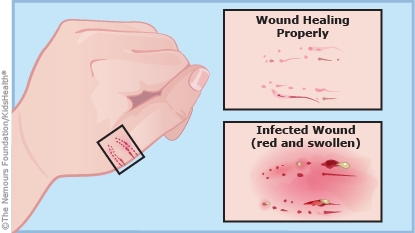Venom is a harmful liquid that some snakes and other animals make in their bodies. Your child was bitten by a nonvenomous snake, which means the snake did not put harmful venom into your child's skin. Nonvenomous snakebites usually don't cause any serious or lasting problems, but they can get infected.
The bite was rinsed thoroughly to help clean out bacteria (germs), and if any of the snake's teeth were left behind in the bite, the health care provider removed them. If needed, your child got a tetanus shot.





What can help prevent snakebites? To make snakebites less likely when kids are outdoors, they should:
What is venom? Venom is the harmful substance that some animals inject into another animal (or person) by biting or stinging them. They do this to protect themselves or to catch prey.
What problems can a nonvenomous snakebite cause? Nonvenomous snakes don't inject venom when they bite, so their bites aren't dangerous. Skin infections are the most common problem that can happen. Signs of infection include warmth around the wound, swelling, pain, redness, and pus. Sometimes snake teeth can remain in the wound, which can cause irritation and increase the risk of infection. A person can have an allergic reaction to a snakebite, but that happens rarely.